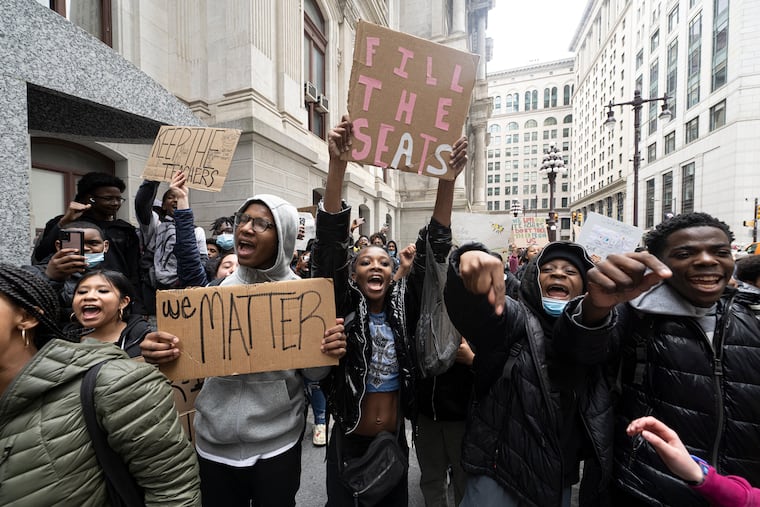More students walk out of Philly schools to protest budget cuts, underenrollment at magnets
“Are we young minds to be cared for, or are we statistics to be ignored?” said Malaya Ulan, 14.

Days after Philadelphia students walked out to protest shifts in the district’s special-admissions process that left some magnet schools with as many as 100 open seats for the incoming ninth-grade class, more students left class as a form of dissent.
More than 100 students walked out of Science Leadership Academy at Beeber at midday Tuesday, making their way to City Hall and marching up North Broad Street to school district headquarters to send a message.
“This lottery really messed us up. This is ridiculous,” said Naomi Green, 18, an SLA Beeber senior.
“Teachers and families, we must unite! Education is a human right!” the crowd chanted.
District officials met the protesters at 440 N. Broad.
Tomás Hanna, assistant superintendent for secondary schools, met the group outside, and said in a statement that officials “hear the students’ concern and appreciate their passion.”
Hanna said he told the students that “the district and a broad-based committee are reviewing the current school enrollment and selection process.”
It wasn’t immediately clear whether students will face discipline for the walkout.
» READ MORE: As some Philly students walk out over possible budget cuts, the district offers some remedies
Changes to the Philadelphia School District’s special-admissions process made in the name of equity have had unintended consequences. Most recently, dozens of seats will be vacant at some of the 39 criteria-based schools after not enough students met the admissions standards. Since the district moved to a lottery system in 2021, principals lost the power they once had to enroll promising students who did not quite meet the established bar.
Because of the projected enrollment losses, a number of district schools were initially notified they would lose multiple teaching and other staff positions — as many as six or more, some teachers said. In total, there are more than 800 open seats in magnets citywide for next year’s class.
After widespread pushback and a Thursday rally ahead of a school board meeting, Superintendent Tony B. Watlington Sr. announced some changes: The district said it would reopen admission to 12 underenrolled magnet schools, but only to the 316 students who had already applied to at least one criteria-based school and had the grades and attendance to qualify. (There were no promises for other schools, including neighborhood or citywide admissions schools without criteria that are projecting big enrollment drops, including Conwell Middle School, in Kensington, or the U School, in North Philadelphia.)
But even if every student eligible to enroll in the 12 schools does so — and some students have likely already made alternate plans for the fall, securing spots at charter or private schools — that would still leave nearly 500 empty seats in the magnets.
The 12 schools are: Philadelphia High School for Girls, Franklin Learning Center, Saul, Lankenau, Motivation, Hill-Freedman World Academy, Parkway Northwest, Parkway Center City Middle College, Parkway West, Philadelphia High School for Creative and Performing Arts, Science Leadership Academy at Beeber, and Arts Academy at Benjamin Rush.
Watlington also said the school system would limit to two the maximum number of enrollment-based staff losses at any of the magnets affected by the admissions policy changes. That promise will cost the district $3 million, the superintendent said.
But the students who walked out Tuesday said they are wary of any district promises and said it isn’t fair that their schools have to brace for any losses because of a policy they had no control over.
Malaya Ulan, an SLA Beeber ninth grader, said she helped organize her fellow students because something had to be done. She stood at the foot of the Octavius Catto statue at City Hall and read a poem she had written.
“Are we young minds to be cared for, or are we statistics to be ignored?” said Ulan, 14.
City Councilmember Kendra Brooks left a budget meeting to address the students. Brooks, mother of a recent SLA Beeber graduate and a longtime education activist herself, said she supported the students fully.
“I understand what it means if just one teacher left,” Brooks said. “We need the voices of the young people that are impacted by this to stand up and fight.”
State Rep. Amen Brown, who’s one in a crowded field running to be Philadelphia’s next mayor, also addressed the students, saying that as a father of two children in district schools, he backed the SLA Beeber group’s sentiments.
“This system is wrong,” said Brown, who then motioned to City Hall behind him. “We need to hold each and every person in these buildings accountable.”
Waving signs that read “Fund this Jawn” and “Fill the Seats,” students moved around Center City determined.
“This is not just an SLA Beeber problem,” said Saifeddine Hakim Mestour, 18, an SLA Beeber senior. “This is a School District of Philadelphia problem.”
Ulan, who also started a Change.org petition to garner support for the cause, said schools around the city are worried about losing “teachers, electives,” and more.
“There’s so many people that want and deserve to be in these schools,” Ulan said. “There’s no bigger consequence than having your entire education be put at stake.”